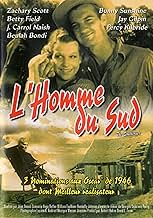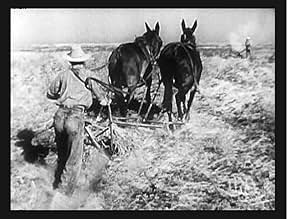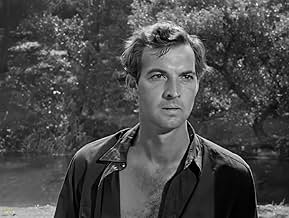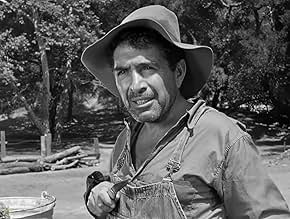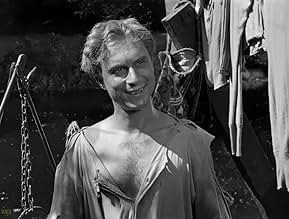PUNTUACIÓN EN IMDb
7,1/10
4,1 mil
TU PUNTUACIÓN
Los Tucker, una familia pobre de jornaleros del algodón, decide comprar su propio terreno, pero la naturaleza está en su contra.Los Tucker, una familia pobre de jornaleros del algodón, decide comprar su propio terreno, pero la naturaleza está en su contra.Los Tucker, una familia pobre de jornaleros del algodón, decide comprar su propio terreno, pero la naturaleza está en su contra.
- Dirección
- Guión
- Reparto principal
- Nominado para 3 premios Óscar
- 3 premios y 3 nominaciones en total
Paul E. Burns
- Uncle Pete
- (as Paul Burns)
Audley Anderson
- Townsman
- (sin acreditar)
Rudy Bowman
- Townsman
- (sin acreditar)
Reseñas destacadas
Renoir was still a master and had definitely not lost his touch when he made this saga about a year in the life of a desperately poor farming family trying to make it. The only thing that mars it, keeping it from rating a 10, are the cutesy-poo children and the saccharine music on the soundtrack, making it perfectly clear exactly how you were supposed to feel at any given moment. I suppose these were necessary nods to Hollywood conventions of the time. Kudos must go to Zachary Scott for the courage of his performance in the lead. An underrated actor, Scott was nearly always cast playing lounge lizards and other assorted slimeballs. Here he appears without his mustache and is almost unrecognizable. Given that Scott aspired to a career as a Gable-type leading man, this role was not a good career move. But it is definitely the performance of his career, and along with the equally outstanding performance of Betty Field, makes the film. Incidentally, I could have done without the over the top performance of Beulah Bondi as Granny; throughout the film I kept hoping Scott would strangle her.
THE SOUTHERNER is notable for giving ZACHARY SCOTT his first real chance to shine as a promising new movie actor headed for stardom, teaming him with the always reliable BETTY FIELD as the wife of a dirt poor farmer in this Depression-era saga, uplifting despite the adversity of their situation due to Jean Renoir's fine direction.
"Grow your own crop," Scott, a Texas farmer, is told by his dying uncle. He struggles with his family to do just that--and THE SOUTHERNER becomes a tale of survival against the cruel twists and turns of nature. BEULAH BONDI is the stubborn Granny whose bark is worse than her bite, but she does tend to get annoying in her whining ways.
Working the land and making farmland self-supporting is never an easy matter and it gets plenty of negative treatment here with the odds against the struggling family at every turn. J. CARROLL NAISH and NORMAN LLOYD as hard-nosed neighbors make themselves utterly unlikeable (but believable) as Scott's uncooperative neighbors, unwilling to spare some milk for him when his son is ill. PERCY KILBRIDE comes to his rescue with a rented cow and later becomes his father-in-law, marrying BLANCHE YURKA.
But there are still hardships ahead, including a severe storm that destroys all the crops, serving to emphasize the man against nature theme of the entire story. Everything is destroyed but the human spirit.
Scott, Field and Bondi give heartfelt performances, with Bondi a bit over-the-top as Granny. It's not in the same class with THE GRAPES OF WRATH but it does create a sympathetic portrait of farmers who work the land.
Based on a novel called "Hold Autumn in Your Hand", it stands the test of time largely because of the performances.
"Grow your own crop," Scott, a Texas farmer, is told by his dying uncle. He struggles with his family to do just that--and THE SOUTHERNER becomes a tale of survival against the cruel twists and turns of nature. BEULAH BONDI is the stubborn Granny whose bark is worse than her bite, but she does tend to get annoying in her whining ways.
Working the land and making farmland self-supporting is never an easy matter and it gets plenty of negative treatment here with the odds against the struggling family at every turn. J. CARROLL NAISH and NORMAN LLOYD as hard-nosed neighbors make themselves utterly unlikeable (but believable) as Scott's uncooperative neighbors, unwilling to spare some milk for him when his son is ill. PERCY KILBRIDE comes to his rescue with a rented cow and later becomes his father-in-law, marrying BLANCHE YURKA.
But there are still hardships ahead, including a severe storm that destroys all the crops, serving to emphasize the man against nature theme of the entire story. Everything is destroyed but the human spirit.
Scott, Field and Bondi give heartfelt performances, with Bondi a bit over-the-top as Granny. It's not in the same class with THE GRAPES OF WRATH but it does create a sympathetic portrait of farmers who work the land.
Based on a novel called "Hold Autumn in Your Hand", it stands the test of time largely because of the performances.
"The Southerner" is a very good film starring Zachary Scott, Betty Field, Beulah Bondi, Norman Lloyd, J. Carrol Naish, and Blanche Yurka. It's the story of a man, Sam Tucker, working as a cotton picker along with his wife and parents. As his father lays dying in the field, he tells his son to own his own land. Sam quits his job and makes arrangements to work the land of his former boss, with the goal of ownership. He's not welcome by his closest neighbor (Naish) and the house on the land is nothing but a shack. The family nearly starves during the winter; the daughter can't go to school because she doesn't have a coat; his son falls ill with "spring sickness" (probably rickets). Nevertheless, Sam and Nona (Field) keep working, Sam knowing that working the land and feeling the sun is the only way he can live.
This is a very absorbing film. You not only see, but feel the struggles of the family and how hard they work no matter the odds, with strength and determination.
Betty Field was a good choice as Nona - she's plain and tired-looking, with a bright smile. The devotion she has to Sam and he to her is very touching. As a couple, she and Scott are very effective. Beulah Bondi is very good as the irascible, annoying, wizened grandmother either complaining or predicting doom and gloom. Naish gives an excellent performance as a jealous and unhelpful neighbor, and Norman Lloyd is appropriately slimy as his worker. It's always hard to relate the skinny Lloyd, who usually played villains, with the older, revered Dr. Auschlander in "St. Elsewhere" - he's had quite a career. As of this writing, he's 93 and still working.
Zachary Scott is okay as Sam but it's not a comfortable fit. The part required more warmth, more depth, and more internal grit; it's a Henry Fonda role. Still, for not being Scott's normal type of sophisticated or villainous part, he handles it well.
A good film, beautifully directed by Jean Renoir, who was nominated for an Oscar. There are some stunning cinematic moments as well. Worth watching for sure.
This is a very absorbing film. You not only see, but feel the struggles of the family and how hard they work no matter the odds, with strength and determination.
Betty Field was a good choice as Nona - she's plain and tired-looking, with a bright smile. The devotion she has to Sam and he to her is very touching. As a couple, she and Scott are very effective. Beulah Bondi is very good as the irascible, annoying, wizened grandmother either complaining or predicting doom and gloom. Naish gives an excellent performance as a jealous and unhelpful neighbor, and Norman Lloyd is appropriately slimy as his worker. It's always hard to relate the skinny Lloyd, who usually played villains, with the older, revered Dr. Auschlander in "St. Elsewhere" - he's had quite a career. As of this writing, he's 93 and still working.
Zachary Scott is okay as Sam but it's not a comfortable fit. The part required more warmth, more depth, and more internal grit; it's a Henry Fonda role. Still, for not being Scott's normal type of sophisticated or villainous part, he handles it well.
A good film, beautifully directed by Jean Renoir, who was nominated for an Oscar. There are some stunning cinematic moments as well. Worth watching for sure.
An employee named Sam Tucker (Zachary Scott)frequently working for others is hired some land and he decides along with his family, -his wife (Betty Field), granny (Beulah Bondi)and two sons - attempt farming for themselves. The family finds hardships on their way and they'll have to fight against the elements,ills, poorness, distresses and a selfish neighbor (J. Carroll Naish) living with his daughter (Nash) and niece (Norman Lloyd) .
This is a rural drama about a survival fight amid all disgraces and terrible elements. It's a naturalistic drama splendidly played and magnificently staged. From the tale 'Hold Autumn in your hand' by George Sessions Perry and writing by William Faulkner though he appears uncredited. It's proceeded in similar style to ¨Grapes of wrath¨ by John Ford based on John Steinbeck novel . First rate performances by all star cast. Special mention to Belulah Bondi as sympathetic and and grumpy granny. And Norman Lloyd as roguish nephew, he's a veteran player still acting , who joined the original company of Orson Welles-John Houseman Mercury Theatre and after that he was hired to Hollywood to play as secondary actor in Alfred Hitchcock movie and other ones and made him an associate producer. Neo-realist and evocative cinematography by Lucien Andriot. Sensible and imaginative musical score by Werner Janssen.
The flick is excellently directed by Jean Renoir. He said about 'The Southerner' gave him more pleasure than any of his other Hollywood work. Renoir was voted the 12th greatest director of all time . Furthermore, Orson Welles frequently cited him as the greatest movie director of all time. He was son of the famous impressionist painter Auguste Renoir. After his French classics (Rules of game 1939, Human beast 38, La Marseillase 36, A day in the country 36, Boudu saved from drowning 32), he was brought to USA by American producers, directing awesome films in Hollywood (Woman on the beach 1947 , The diary of a chambermaid 46, The Southerner , The land is mine 43, Swamp water 1941). Later on, he returned to France , going on film-making classic movies (Elusive corporal 1962, Picnic on the grass 59, Testament of Dr Cordelier 59, Golden coach 52, The river 1951). Rating : Better than average, well worth watching.
This is a rural drama about a survival fight amid all disgraces and terrible elements. It's a naturalistic drama splendidly played and magnificently staged. From the tale 'Hold Autumn in your hand' by George Sessions Perry and writing by William Faulkner though he appears uncredited. It's proceeded in similar style to ¨Grapes of wrath¨ by John Ford based on John Steinbeck novel . First rate performances by all star cast. Special mention to Belulah Bondi as sympathetic and and grumpy granny. And Norman Lloyd as roguish nephew, he's a veteran player still acting , who joined the original company of Orson Welles-John Houseman Mercury Theatre and after that he was hired to Hollywood to play as secondary actor in Alfred Hitchcock movie and other ones and made him an associate producer. Neo-realist and evocative cinematography by Lucien Andriot. Sensible and imaginative musical score by Werner Janssen.
The flick is excellently directed by Jean Renoir. He said about 'The Southerner' gave him more pleasure than any of his other Hollywood work. Renoir was voted the 12th greatest director of all time . Furthermore, Orson Welles frequently cited him as the greatest movie director of all time. He was son of the famous impressionist painter Auguste Renoir. After his French classics (Rules of game 1939, Human beast 38, La Marseillase 36, A day in the country 36, Boudu saved from drowning 32), he was brought to USA by American producers, directing awesome films in Hollywood (Woman on the beach 1947 , The diary of a chambermaid 46, The Southerner , The land is mine 43, Swamp water 1941). Later on, he returned to France , going on film-making classic movies (Elusive corporal 1962, Picnic on the grass 59, Testament of Dr Cordelier 59, Golden coach 52, The river 1951). Rating : Better than average, well worth watching.
Beautifully shot, absorbing film about the close-knit Tucker clan - Sam (Zachary Scott), the handsome dad who loves being a farmer, Nona (Betty Field), a good wife and mother who always seems to look well-groomed in spite of her hard work, two really cute kids, and then there's ornery old Granny (Beulah Bondi), she of the sharp tongue and stubborn will. In a gorgeously photographed scene where they are working for hire in the bright, sunlit fields picking cotton - the couple watches as their Uncle dies in the fields saying in his last breath "Grow your own crops", and they decide to do just that. Soon they have rented a property where they can raise cotton and be their own masters, so to speak - well, the house turns out to be nothing but a broken-down, ramshackle shack, the whole place needs loads and loads of work - but one good thing" it has "good earth". Troubles ensue - trouble with the neighbors, trouble getting food, sickness troubles, weather troubles, oh brother!
Well, this is an excellent, heartfelt, and well photographed film done in an unusual, distinctive style. The actors who play the Tucker family do a good job in making this actually seem like a real family and make you want to root for them - but it is Beulah Bondi as cantankerous Granny who really steals this film for me - I really enjoyed her scenes and thought they added a little spice to this! The hardships this clan has to go through can be hard to watch sometimes, but the story is involving and the film is quite memorable.
Well, this is an excellent, heartfelt, and well photographed film done in an unusual, distinctive style. The actors who play the Tucker family do a good job in making this actually seem like a real family and make you want to root for them - but it is Beulah Bondi as cantankerous Granny who really steals this film for me - I really enjoyed her scenes and thought they added a little spice to this! The hardships this clan has to go through can be hard to watch sometimes, but the story is involving and the film is quite memorable.
¿Sabías que...?
- CuriosidadesBased on the novel "Hold Autumn in your Hand", by George Sessions Perry, which won the first National Book Award in 1941.
- PifiasWhen Finley whipped the cows the dog disappeared for a second Indicating a film cut.
- ConexionesEdited into 365 days, also known as a Year (2019)
Selecciones populares
Inicia sesión para calificar y añadir a tu lista para recibir recomendaciones personalizadas
- How long is The Southerner?Con tecnología de Alexa
Detalles
- Fecha de lanzamiento
- País de origen
- Idioma
- Títulos en diferentes países
- The Southerner
- Localizaciones del rodaje
- Madera, California, Estados Unidos(cotton fields)
- Empresas productoras
- Ver más compañías en los créditos en IMDbPro
Taquilla
- Presupuesto
- 750.000 US$ (estimación)
- Duración1 hora 32 minutos
- Color
- Relación de aspecto
- 1.37 : 1
Contribuir a esta página
Sugerir un cambio o añadir el contenido que falta

Principal laguna de datos
By what name was El sureño (1945) officially released in India in English?
Responde


